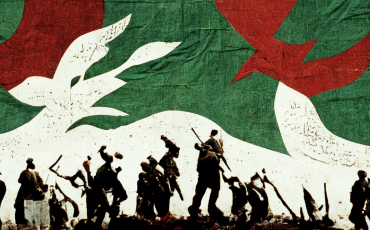Earlier this year talks between the Houthis and Saudi Arabia raised hopes for peace in Yemen. Europe is no bystander, argues our author, and examines how the continuous export of European weapons is fueling a decade-long crisis in Yemen.
2023 is the year of Yemen’s limbo: no bombs are currently dropping, but, as Yemenis know very well, that does not mean peace. Saudi Arabia, eager to withdraw from the conflict, is entertaining diplomatic negotiations with the Houthis, also known as Ansar Allah, a rebel armed group that has been the catalyst of pervasive instability in the small Arab country since the mid-2000s as well as firmly unyielding to the geopolitical pressures of Riyadh. Experts, however, are stifling the enthusiasm of those who see in these talks an opportunity for sustainable peace, because the almost decade-long war involves many other actors such as the US, Iran, the Arab coalition (often referred to as anti-Houthi-coalition) to name a few, who will not easily compromise. Fueled by European and American arms, the conflict could re-escalate at any moment, despite Riyadh’s willingness to sit at the table with the Houthis.
Yemen’s history is riddled with conflict. Caught between internal civil strife and external influences, Yemen has often borne the brunt of irreconcilable geopolitical interests, including past and current European interests. More recently, by providing weapons, surveillance gear, and tactical support, European states have been not so obvious, but essential partners of the anti-Houthi coalition made up of seven states (United Arab Emirates, Egypt, Morocco, Jordan, Bahrain, Sudan, Kuwait) and led by Saudi Arabia.
In the late 2010s the weapons exports from Europe to the coalition came to a brief halt, following the thousands of air strikes carried out especially by the Saudis and the Emiratis. Today, however, many European states are resuming the arms trade in the region, possibly undermining the current timid efforts to secure stability.
Operation Decisive Storm
The events that cleared the path for the (controversial) operations of the Saudi-led coalition, started to unfold in 2004, when the Shia religious leader Hussein Badreddin al-Houthi incited his followers, the Houthis, to rebel against the government. The following years were marked by terroristic attacks, suicide bombings and other politically motivated clashes between the then president Ali Abdullah Saleh’s government and the Houthis, even after the death of Hussein Badreddin the same year the uprising started.
After years of interminable skirmishes, in which all parties to the conflict reportedly committed human rights violations, in 2015 the anti-Houthi-coalition launched Operation Decisive Storm. This operation has been characterized by frequent airstrikes and a naval blockade that resulted in what the UN would consider “the worst humanitarian crisis” in the world. In the meantime, the UN Security Council imposed an arms embargo on the Houthis.
The airstrikes were conducted by the members of the coalition, still the tactical support of the US was pivotal in their protraction. But the involvement of the European weapons’ industry in the conflict feeds the suspicion of European states’ complicity in these often unlawful attacks.
Hollow commitments?
Weapons exports to states involved in an armed conflict constitute a violation of international law, in particular the 2013 “Arms Trade Treaty”, which regulates the international transactions involving armament. While the US signed but did not ratify the treaty, the EU Member States did. Prior to this, in 2008, they agreed to supranational legislation in the form of a Council Common position that aims to prevent the supply of weapons to regions where they could potentially contribute to further instability.
In most instances national laws had already been put in place, as in the case of law 185/90 in Italy. All these regulations, however, did not hinder the three main European weapons exporters, France, Germany and Italy, from shipping arms to the Saudi-led coalition over the years - despite evidence of possible war crimes committed with those very weapons.
The aircrafts of discord
The actual exports do, in fact, breach those self-imposed restrictions. During Operation Decisive Storm, Saudi Arabia purchased multiple warplanes from European companies, according to a report compiled by the Dutch peace organization Vredesactie. These transactions were carried out despite the ongoing airstrikes, which would often target civilians and civilian infrastructure.
The exports included 72 Eurofighter Typhoon bomber jets produced by the company Eurofighter Jagdflugzeug GmbH, a joint venture of the British BAE Systems, the French Airbus, with its German and Spanish subsidiaries, and the Italian Leonardo. The UAE bought aircrafts from European weapon manufacturers as well, namely bomber jets by the French Dassault Aviation and the tanker aircrafts produced by Airbus. Unsurprisingly, there is extensive evidence proving the active role of these vessels in the bombing of Yemeni civilians.
Germany, a conflicted exporter
As already mentioned, German weapons, be it naval, ground or aerial assets, have often been part of the coalition’s operations in Yemen. This is even though Germany’s export policies are supposedly very restrictive as they do not allow for the shipment of weapons to countries at war and require the purchasers to sign an end-user agreement which forbids them from transferring the weapons. Angela Merkel’s chancellorship eventually led in 2018 to a pledge to suspend exports to any country directly involved in Yemen.
However, a recent parliamentary discussion, initiated by Member of the Bundestag and the leftist party Die Linke Sevim Dağdelen, revealed that Germany did grant several licenses to some parties to the anti-Houthi-coalition between 2021 and 2022, such as Kuwait, Bahrein, UAE, and Egypt, while avoiding overtly controversial exports to Saudi Arabia. As a response, the federal government stressed the fact that exports to Saudi-Arabia would continue to be rejected and only be possible as an exception stemming from obligations towards Nato and EU allies. However, as Dr. Max Mutschler, researcher at the Bonn International Centre for Conflict Studies, tells Tagesschau, almost all military productions are the result of joint projects and programs with EU and Nato partners, which would make Germany’s participation less of an exception but increasingly the rule.
In October 2022, not even a month after Dagdelen interrogated the Bundesregierung on these transactions, Germany approved the export of arms to Saudi Arabia – probably with the ultimate goal of securing oil and hydrogen supplies during the energy crisis by deepening the relations.
France’s arms diplomacy
But Germany is not the only EU country embroiled in sketchy arms deals. The French defence industry suffers from a concerning lack of transparency, as the only document disclosing information on its transactions is the annual report to parliament. In September 2022 the parliamentary report revealed that French corporations made a profit of over 11.7 billion euros in weapons exports to foreign countries, like Egypt, UAE and Saudi Arabia, despite their involvement in several breaches of international humanitarian law in Yemen.
French jurist and writer Aymeric Elluin, interviewed by Jacobin.com, reflects on how the arms trade is a key element of French foreign policy, in what he calls “arms diplomacy”, that is, the attempt to gain leverage and power through weapons supply to key actors like Egypt, the Gulf countries or India. However, he also points out how France’s commercial relationships with often controversial countries, like Saudi Arabia, has not resulted in any tangible influence over the coalition for what concerns the war in Yemen. Elluin, however, is convinced that arms diplomacy does not actually exist: What definitely exists is the market interests generated by billion-euro deals, which seem to be at the heart of Italy’s exports as well.
Italian bombs
On 31 May 2023 the Italian Council of Ministers approved the repeal of the 2021 ban on weapons exports to Saudi Arabia, a few months after the Italian government had done the same for the UAE. The reasons warranting this suspension of exports in the first place – that is, the active conflict in Yemen and the corresponding risk of improper use of the weaponry exported – were (supposedly) no longer a problem. Coincidentally, the Gulf is the most prominent recipient of Italian arms. The licenses were revoked only once the war crimes were too blatant to turn a blind eye. In fact, some of them had been granted long after the outbreak of the 2014/2015 clashes between the coalition and the Houthis.
In 2021 the government, under the leadership of Giuseppe Conte withdrew six licenses from RWM Italia SpA for a total of 328 million euros related to bombs and missiles to be shipped to the UAE and Saudi Arabia. However, the report presented in parliament (as per law 185/90 on the transparency of arms exports) in 2022, claims that among the 45.9 million euros worth of armaments destined to Riyadh, many were special bombs, rockets, missiles and other, which, according to arms trade analyst Giorgio Beretta, cannot be traced back to specific licenses, as there were supposed to be none associated with the two Gulf countries.
Shattering glass
The current situation in Yemen is as fragile as it is potentially explosive. The civilian population has endured years of starvation, conflict, and human rights violations. Indeed, it may be too soon to speak of peace – or at least, sustainable positive peace - but this is a rare opportunity in which the key actors seem to be more open to dialogue. The Houthis will try to turn the situation in their favor, as will surely the members of the coalition, but recent encouraging developments have given a much-needed breath of fresh air to the people of Yemen. The stakes are still high, though, and the game is not over yet.
However, one thing is certain: resuming weapons’ exports from Europe to the anti-Houthi-coalition cannot but fan the flames of war, contributing to a human rights disaster. The respect for human rights is enshrined in most European constitutions, including the German, French and Italian one, as well as in the founding treaties of the EU. Disregarding these fundamental commitments in the name of capitalist gain or supposed arms diplomacy and moving the goalposts of what is acceptable and what is not acceptable in war, not even a century after the atrocities of World War II, undermines the democratic foundations of these countries as well as their credibility.





















